
What supplements should you take?
What supplements do you take with your training? Let’s first look at the definition of the supplement: a thing added to something else in order to complete or enhance it. So where your nutrition is both balanced and healthy you may have no need for any further supplementation.
Introduction
The supplement industry for the fitness community is a multimillion dollar industry. With that In mind, we need to look at the fitness market today and the amount of supplements on the market like BCAA’s, pre and post workout, HMB, CLA, protein, creatine and the list goes on. Each product marketing their benefits and how important they are for achieving the results they want. With that said though are, they even necessary or are you throwing your money away?
The facts
The first thing you need to do is to look at your own diet and see if you are lacking in any area where you may need a supplement. If you are eating a good healthy diet with fruit, veg, carbohydrates from whole foods and a rich protein source then probably you don’t need any supplements.
I would always advise getting most of your nutrition from whole food choices (90%). It will ensure that supplements should be taken as a minimum.
Key supplements that may be deficient
Some key supplements that are often lacking though in people’s diet which may require additional supplements are:
- Protein – Repair, Maintain, Grow. Protein is especially important to consume after a workout as during the exercise you are effectively breaking your muscles down. Also, a lot of people’s diet does not include enough protein on a daily basis. The most common suggestion is 1 gram of protein for every lb of weight. The research evidence of the need to take anymore is very contradicting.
- Omega-3 – research has found that muscle strength and neuromuscular function was significantly improved when omega-3 supplementation was combined with resistance exercise.
- Creatine – The creatine that is normally present in human muscle may come from two potential sources, dietary (red meat), and/or internally manufactured. What isn’t present in the diet is easily made by the liver and kidneys from a few amino acids. However, individuals who don’t eat a lot of red meat may benefit from a creatine supplement, but not necessary at the level that supplements companies are often promoting.
Summary
This is a very controversial topic; it is important to do some research of your own before considering taking any supplementation.



